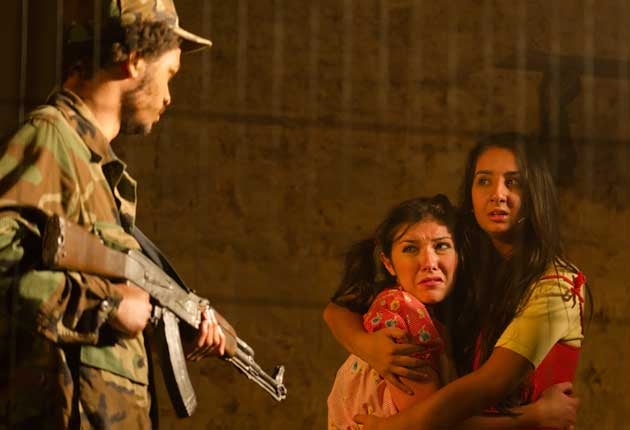Our Days of Rage, Old Vic Tunnels, London

Your support helps us to tell the story
This election is still a dead heat, according to most polls. In a fight with such wafer-thin margins, we need reporters on the ground talking to the people Trump and Harris are courting. Your support allows us to keep sending journalists to the story.
The Independent is trusted by 27 million Americans from across the entire political spectrum every month. Unlike many other quality news outlets, we choose not to lock you out of our reporting and analysis with paywalls. But quality journalism must still be paid for.
Help us keep bring these critical stories to light. Your support makes all the difference.
Talk about topicality. While the fight for Tripoli intensified and rebels captured the Gaddafi compound, the National Youth Theatre has been opening a new play, Our Days of Rage, which dramatises four decades of struggle against his regime.
Devised in response to the Arab Spring and to more recent home-grown riots, the piece – which is the work of nine young writers – sends the audience on a walkabout through the cavernous Old Vic Tunnels. Arrestingly orchestrated by Paul Roseby and performed with biting vibrancy by the large NYT company, the production certainly offers a powerful, immersive experience as punters are pitched into the thick of various protests, such as the demo during the 1984 siege of the Libyan embassy. But the lack of any singular vision makes this ambitious show frustratingly fragmentary and superficial.
When we first meet the half-Libyan Hanna (excellent Daniella Isaacs), she's a smart financier who has lost her way to the "Art of Protest" gallery-event in Lambeth that she has organised on behalf of her employers, the World Bank. As she is guided on a short cut through the tunnels by BR workers, we are taken on a journey through the formative events of her past. Because of her father's dissident articles, her family are forced to flee to Britain in 1979 and we see how the schoolgirl Hanna, traumatised by having witnessed the rape of her older sister by Gaddafi's thugs, seeks refuge from her troubled heritage in the certainty of numbers and a thrusting capitalist ambition.
But the background of Britain's shifting relations with Libya is irritatingly sketchy. There is little psychological follow-through and Hanna's unsubtle trajectory is from extreme one to the other. The best scene is where she is challenged by the sister who remained in Libya while fronting a British Trade delegation (a photograph of the Blair-Gaddafi handshake prominently on display). But when that sister is killed in the Nato bombings, we are asked to believe that it turns Hanna into a suicide bomber who is prepared to upstage the art at her World Bank exhibition with the ultimate art of violent protest. As it's portrayed here, that conversion makes little emotional or political sense. Like Greenland, the National's disappointing eco-play, Our Days of Rage is not a glowing advertisement for multi-authorship.
To 15 September (0844 871 7628)
Join our commenting forum
Join thought-provoking conversations, follow other Independent readers and see their replies
Comments